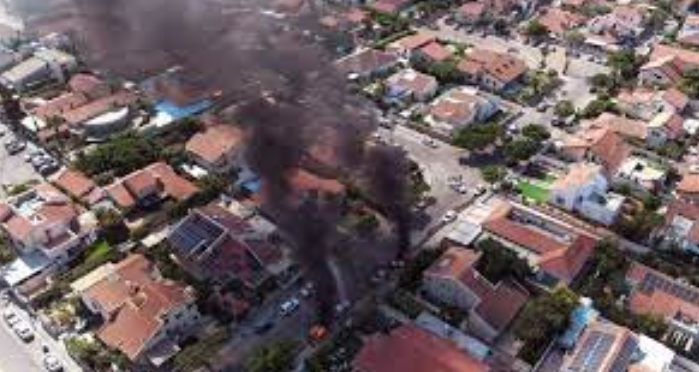Best Free Resources for Traders in 2025: From Charts to AI Alerts
December 01 , 2025

Explore the Israel-Qatar conflict, international reactions, regional implications, and the impact on diplomacy and Middle East stability.
On September 9, 2025, tensions escalated dramatically in the Middle East as Israel conducted an airstrike in Doha, Qatar, targeting Hamas political leaders involved in ceasefire negotiations. The unprecedented attack resulted in the deaths of several individuals, including Hamas officials and a Qatari security officer, sending shockwaves through the region and eliciting global condemnation. This conflict highlights the fragility of regional diplomacy and the complexities of international relations in the Middle East.
Qatar has historically played a key role as a mediator in the Israeli-Palestinian conflict, often hosting discussions between Hamas and international stakeholders. The airstrike took place during a meeting aimed at evaluating a U.S.-proposed ceasefire plan for Gaza. Israel, led by Prime Minister Benjamin Netanyahu, justified the operation by accusing Qatar of harboring terrorists and warned that similar actions would continue unless Hamas officials were expelled from Qatari territory.
Qatar condemned the attack as “state terrorism” and promised to pursue a collective regional response, emphasizing its commitment to mediation and diplomatic engagement. This marks a significant challenge to Qatar’s role in facilitating dialogue and maintaining regional stability.
The Israeli airstrike prompted swift international responses, with reactions varying based on political alignments and diplomatic considerations.
The U.S. administration expressed displeasure over Israel’s unilateral action on Qatari soil. While affirming Israel’s right to defend itself, the White House, under President Donald Trump, apologized to Qatar and pledged efforts to prevent similar incidents in the future. This delicate balance highlights the challenge of supporting an ally while upholding international norms.
The European Union condemned the airstrike as a breach of international law, stressing the importance of respecting national sovereignty and protecting civilians. EU officials called for restraint from all parties and urged renewed diplomatic efforts to prevent further escalation.
The UN Secretary-General described the attack as a “flagrant violation” of Qatar’s sovereignty and territorial integrity. The UN called for immediate dialogue to de-escalate tensions and reaffirmed the necessity of protecting civilians during armed conflicts.
Several Arab states, including the United Arab Emirates and Bahrain, expressed outrage at the attack. Some officials labeled the strike as “blatant and cowardly,” emphasizing the need for collective regional security measures and diplomatic solidarity with Qatar.
Qatar’s ability to serve as a neutral mediator in the Israeli-Palestinian conflict has been significantly undermined. The attack raises questions about the safety of diplomatic venues in the region and may compel Qatar to reassess its approach to mediation. Analysts suggest that Israel’s actions could lead to a temporary halt in ceasefire negotiations, forcing regional powers to reevaluate diplomatic strategies.
The incident also places strain on Qatar’s relations with both Israel and the United States, potentially reshaping alliances and regional power dynamics. Doha’s response may include bolstered security measures, increased coordination with neighboring states, and a call for international support to safeguard its diplomatic missions.
The strike has heightened concerns about the broader stability of the Gulf region. Hezbollah has warned that Gulf nations could become targets if Israel continues its military operations against militant groups. This rhetoric contributes to an already volatile security environment, increasing the risk of further escalation and cross-border conflicts.
Regional experts emphasize that continued aggression could undermine ongoing peace efforts, exacerbate humanitarian crises in Gaza, and intensify public unrest. Strengthening diplomatic channels and engaging in multilateral dialogue remain critical to preventing a broader conflict.
The Israel-Qatar conflict has far-reaching implications for international diplomacy. Countries worldwide are closely monitoring developments, with potential consequences for trade, military cooperation, and regional alliances. The attack also underscores the delicate balance between counterterrorism objectives and adherence to international law.
Global powers are now faced with the challenge of supporting stability while preventing unilateral actions that could provoke wider conflicts. The incident highlights the need for coordinated responses and the enforcement of international norms to ensure that future diplomatic efforts are not undermined.
The airstrike has significant humanitarian implications. Civilian casualties, disruption of diplomatic operations, and heightened regional tensions create an urgent need for humanitarian assistance and protective measures. International organizations and NGOs are likely to increase monitoring and relief efforts to address immediate needs and prevent further civilian suffering.
The Israel-Qatar airstrike represents a critical juncture in Middle East geopolitics. It challenges Qatar’s role as a mediator, tests international responses to violations of sovereignty, and raises serious concerns about regional stability. The global reactions underscore the complexity of achieving peace in the region, as political, security, and humanitarian considerations intersect.
As the situation unfolds, the international community must prioritize dialogue, restraint, and multilateral cooperation to prevent escalation and preserve the prospects for a peaceful resolution. The incident serves as a stark reminder that diplomatic efforts remain fragile and that the path to lasting peace requires vigilance, collaboration, and respect for international law.
#IsraelQatarConflict #MiddleEastTensions #QatarDiplomacy #IsraelAirstrike #GlobalReactions #GazaCeasefire #MiddleEastNews #InternationalRelations #QatarIsraelNews #PeaceInMiddleEast